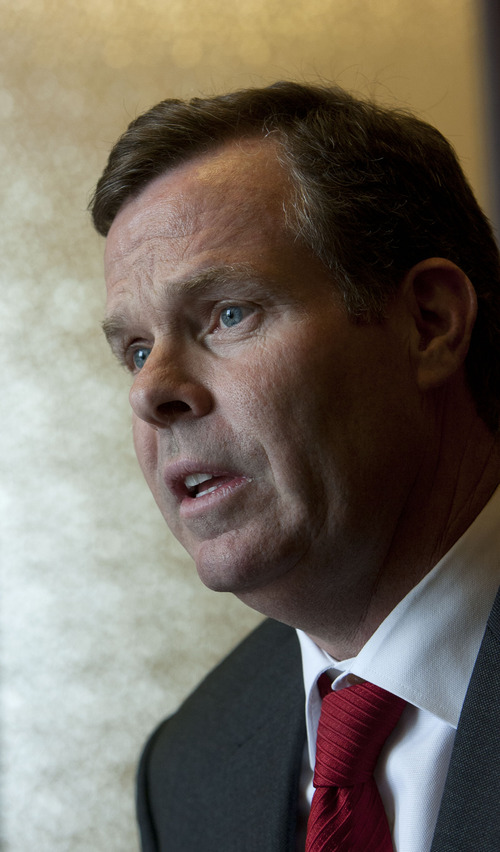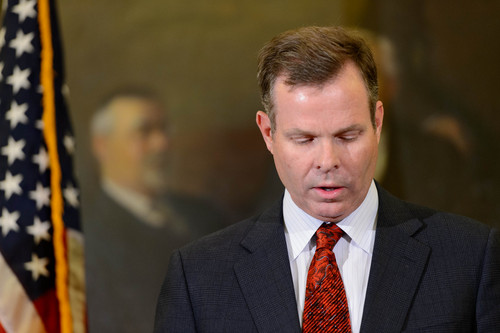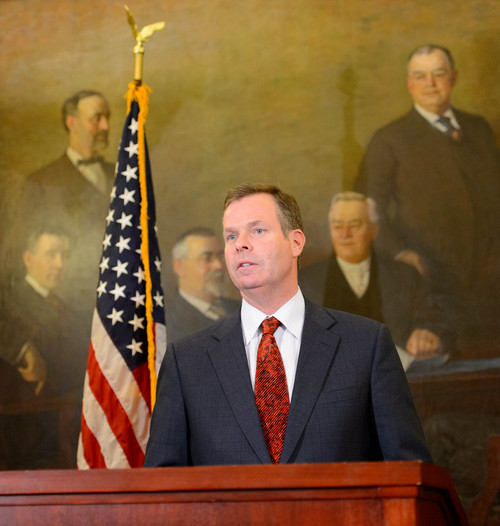This is an archived article that was published on sltrib.com in 2013, and information in the article may be outdated. It is provided only for personal research purposes and may not be reprinted.
John Swallow's looming departure as Utah attorney general has reignited a debate about whether appointing the state's top lawyer would avoid scandals such as the one that engulfed his office for nearly a year.
A proposal to amend the Utah Constitution to make the attorney general an appointed rather than elected position is being drafted and will again be considered during the upcoming legislative session.
If two-thirds of the Legislature signs off, the measure could land on the 2014 ballot and take effect by the 2016 election.
Sen. Todd Weiler, R-Woods Cross, who floated the idea earlier this year after the Swallow scandal erupted, is sponsoring the measure, but said Friday he isn't ready to discuss it publicly.
During a legislative hearing in May, Weiler said he would be interested in having the Legislature appoint the attorney general. One other state does that; five have the governor appoint the position.
"The question here is: Do we want the best lawyer or the best politician as the state's chief law enforcement officer?" Weiler asked in May. "I know it's a big deal to take this away from the people, but I'm absolutely convinced it's the best policy for the state."
Former U.S. Attorney for Utah Brett Tolman argues that appointing the attorney general — as occurs at the federal level — makes sense.
"When you're appointed," he said, "you don't come through all the political glad-handing, raising money and what a lot of us don't like about politics in this day and age."
When he worked as the state's top federal prosecutor, Tolman noted, his bosses were the president and the U.S. attorney general. He said there were times — particularly on immigration — when he felt leaned on from above. But he and other U.S. attorneys were able to resist political pressure.
That is preferable, he said, to what Utah has experienced in recent years with Swallow and his predecessor, Mark Shurtleff.
"The potential for abuse, given the allegations that have been swarming for years around Shurtleff and Swallow, kind of reveals that, even if the abuse is not there, the perception is so great," Tolman said. "In a position that is the attorney who is supposed to be representing the legal interests of the state, we shouldn't even have that potential."
Swallow, whose last full day as attorney general is Monday, and Shurtleff drew attention, for instance, with their campaign fundraising. The two Republicans amassed tens of thousands of dollars in donations from telemarketers, multilevel marketers, coaching companies, alarm companies, payday lenders and other industries that are frequent targets of state regulators.
When Sen. Steve Urquhart, R-St. George, floated the idea of making the position appointed back in 2011, Shurtleff pushed back, saying an elected attorney general enjoys more independence.
Damon Cann, a political scientist at Utah State University, said changing who chooses the attorney general only shifts where the pressure comes from. Appointed attorneys general may not endure the same heat from donors, but they may face even greater pressure from the governors who picked them.
Filling Supreme Court openings, for example, has become very political, Cann said.
"Mistakes will happen sometimes under either system," Cann said. "The attorney general may be independent from the pressures of donors and citizens, but he would certainly be more dependent on the governor," who has his or her own group of donors.
Ultimately, Cann said, the issue is less about the structure and selection of the attorney general than it is about the integrity of the person picked.
Seven states currently have an appointed attorney general.
Five of them — Alaska, Hawaii, New Hampshire, New Jersey and Wyoming — are appointed by the governor. In Tennessee, the Supreme Court picks the attorney general. In Maine, the Legislature does so.
Brian Tarbet — the general counsel for the Utah attorney general who will run the office until Swallow's replacement takes over next month — said in May that fundraising concerns are not unique to the attorney general's office. County attorneys and other prosecutors face similar issues.
"I'm not sure," Tarbet said, "you want to point to the federal system, in light of our experience with independent prosecutors and special counsels, as if that's any panacea."
Twitter: @RobertGehrke —
Swallow's replacement
Members of the Republican State Central Committee are scheduled to meet Dec. 14 to whittle a field of contenders to replace Attorney General John Swallow to three names. Those names will be sent to Gov. Gary Herbert, who will choose one of the three to serve until an attorney general is elected in November 2014 and takes office in January 2015..







